If a GC guy is going to win a one-day race, it might as well be the big one.
– This story was originally published in RIDE Cycling Review (issue 46), October 2009 –
The world championship was in his European backyard; Cadel Evans was on roads he would conquer. The victory created history. It was a beautiful moment for cycling – one earned in style by an honest guy.
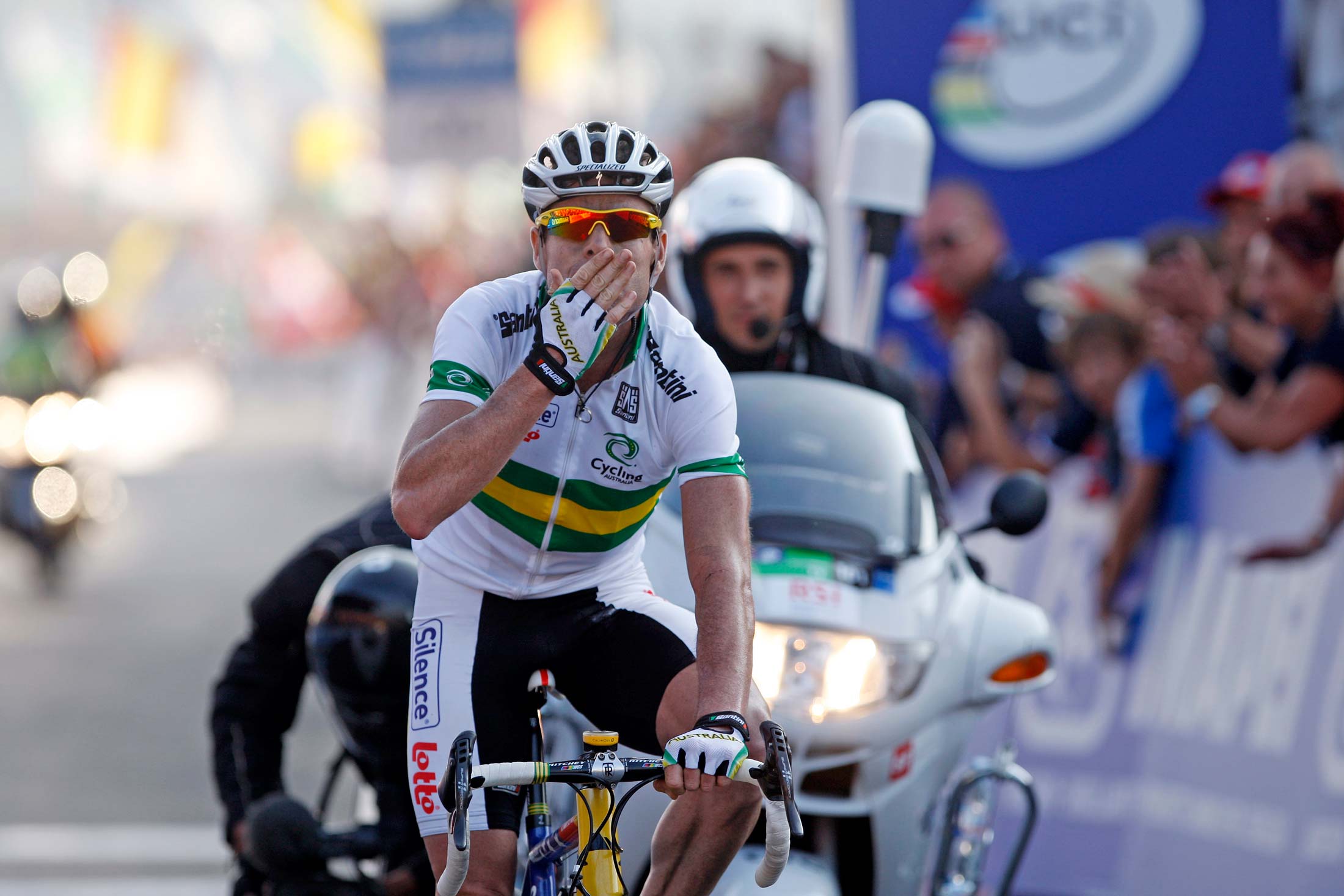
The victory in Switzerland was achieved a short distance from where Cadel Evans lived at the time. Photo: Yuzuru Sunada
There was fury in each pedal stroke. I! Am! Going! To! Win! This! Race! You can repeat it with a grunt of breath at the end of each word and think: that’s it, he tamed it with aggression. Finally, some observers suggested, he had attacked. And that’s when he won.
No, he unleashed his power and did what many believed he could: become the best bike rider in the world.
It was the confirmation of a champion.
Now he could purge himself of what had burdened him. Success is what he always strived for but it had often eluded him because of reasons beyond his control. This time, however, victory was his and it came in the form of a world championship title near the Australian’s Swiss base.
These were Cadel’s worlds to win. He had form and motivation, support and knowledge that an ambition could be achieved.
“I am going to win this race.”
How else could he have found the power to push on the pedals faster than you could say the words?
There had been other aims for the season, but the road race in Mendrisio was identified long ago as something he believed he could succeed in.
He had never been bold enough to suggest this in the lead-up to the race in Switzerland at the end of the season, but his body language at last revealed what everyone knew he wanted to express: these are my worlds, and this is my time…
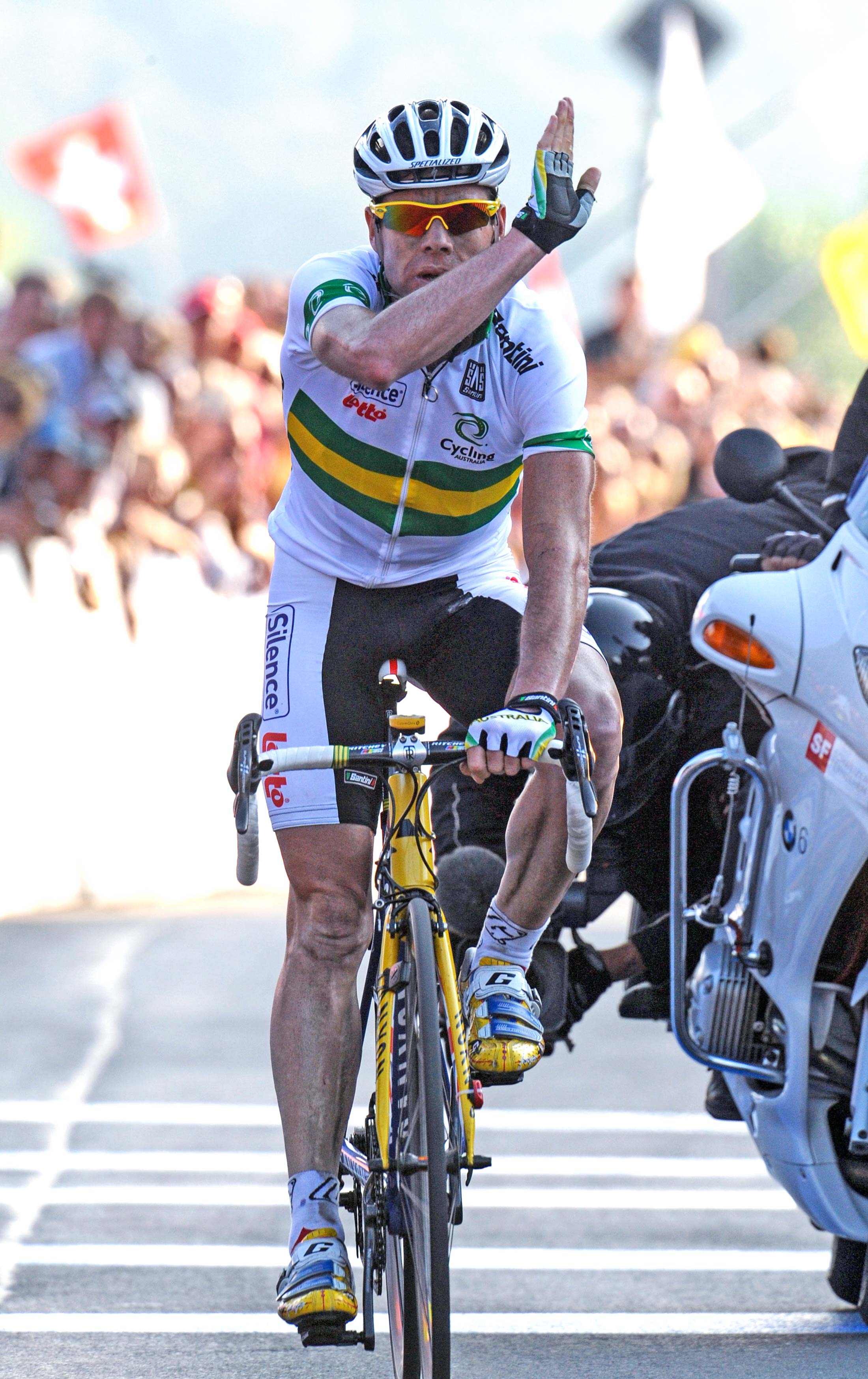
Evans finished third in Vuelta a España of 2009, which was also the first year in which he took a backward step in his quest for victory in the Tour de France. Photo: Graham Watson
Before 27 September 2009 there was Cadel – a bike rider in his prime, a man capable of great things, a solid prospect, a regular contributor to the results sheet, a guy with impressive ability who had become an integral character of a sport going through significant change. An honest force who often came close to victory but, for one reason or another, was never quite able to snare the big one.
We all know about the closest calls, because finishing second in the Tour de France is not something that escapes the headlines.
He kept Aussies awake longer than most would have liked during the cold month of July as he plied his trade on the roads of Europe, doing his ‘day job’.
He’s a GC rider. That’s what he calls himself. He wants to be on top of the general classification. And that’s what his team pays him to do. Then came the call-up for national duties.
In the world championship he wore his country’s colours and while it was his audacious attack in the closing kilometres that earned him the right to salute – one that was later politely declined in favour of a gentle wave of the hand and a few well-aimed kisses – it was a team effort. Cadel’s worlds had been promised for so long that when the moment was realised, he did not gush.
He raced to the line, a gesture of never surrender. ‘All the way’ is his approach; time is of the essence. But, for once, it wasn’t about time.
This was the maiden one-day race victory for the GC Guy.
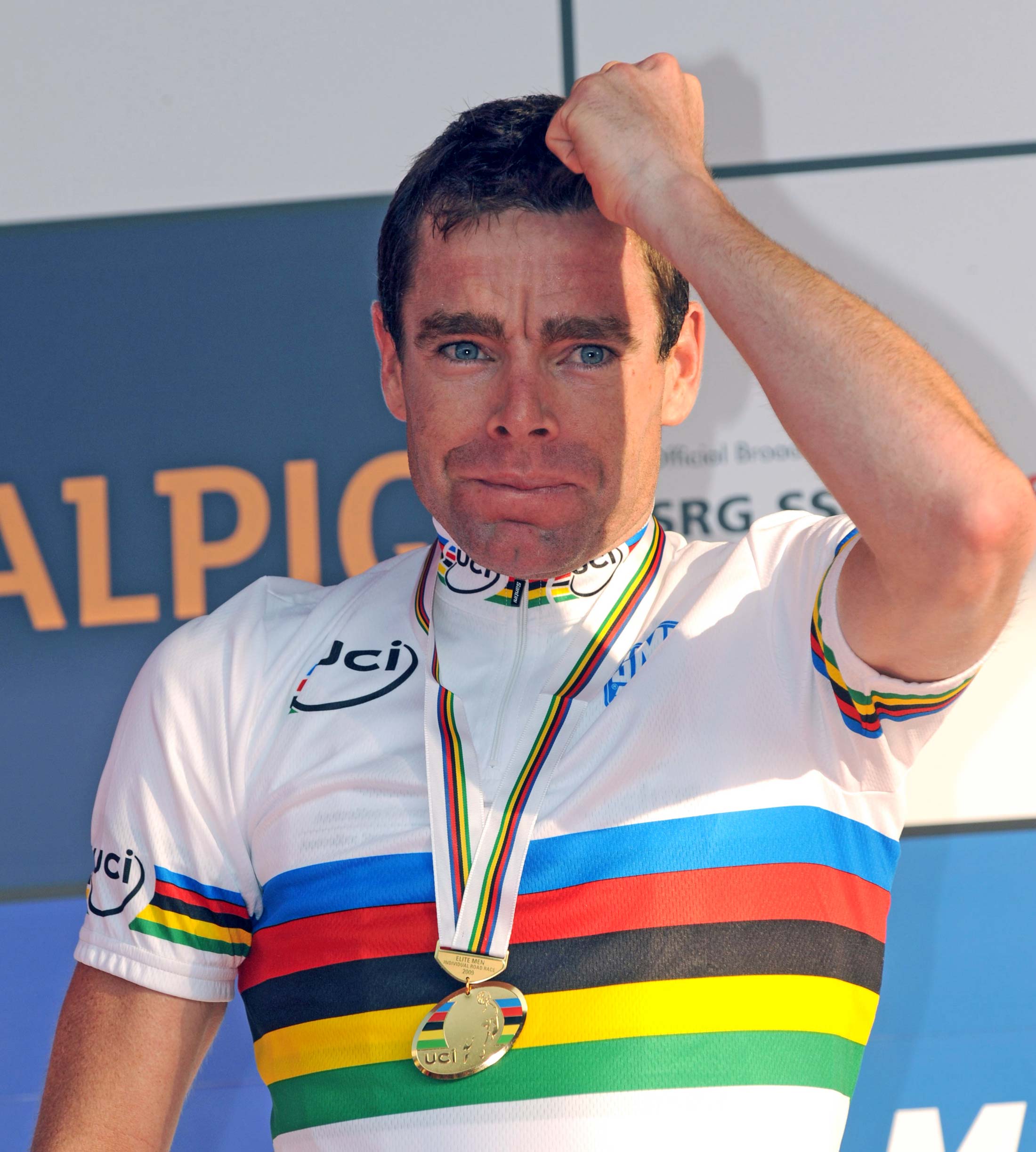
A rainbow jersey – won near his European home, a year before the worlds were contested near his Australian home. Photo: Graham Watson
“I didn’t know if I had a lead of five seconds or 50,” he said two days later, with time to reflect and, for once, watch the replays. This is not normally his habit. He generally doesn’t like to watch footage of himself compete, unless it’s a time trial and he can observe his position and consider improvements.
He would win by 27 seconds. Silver and bronze – Alexandr Kolobnev and Joaquin Rodriquez – had lost their race seven kilometres earlier.
On the approach to the Novazzano climb, the final one of the 262.2km race, there were three in the lead. There was a look to the left by the Russian, a shoulder shrug from the Spaniard. And then the Australian pounced, opening up a margin that would eventually be sufficient should he opt for an animated gesture as he crossed the line.
He didn’t throw his arms aloft.
He didn’t zip up his jersey.
He eventually stopped pedalling but didn’t take a hand off his handlebars.
There was no gesture to fire a pistol or do something else he could later trademark.
Why expect the norm from a man who was doing something out of the ordinary?
He laughs when reminded that he raced to the line like time mattered. It was something new for him.
“Having been so close before, even looking like the win was in the bag, I refused to celebrate too soon. I’ve lost world titles because of a puncture or a crash near the finish before. In my experience, it’s never over until you cross the finish line so I was taking no chance.”
He has been in focus before. Since his teenage years Cadel had been a rider destined to win a world championship. But it didn’t happen until he was 32, when half a lifetime of toil was rewarded in Mendrisio.
There’s a lot more to winning a bike race than simply being the fastest rider in the field.
Before 27 September there were numerous articles that examined the nature of the world championship road race and the conclusion was that this one-day contest near the end of the season was a lottery. Escapes could be made and allegiances formed – national pride or professional commitments could, as they have in the past, factor into the outcome.
The course changes every year. One year it might suit a sprint, the next it could be considered a climbers’ course, and this affects the result.
On the menu in 2009 was a circuit that suited the characteristics of several riders but one knew it intimately.
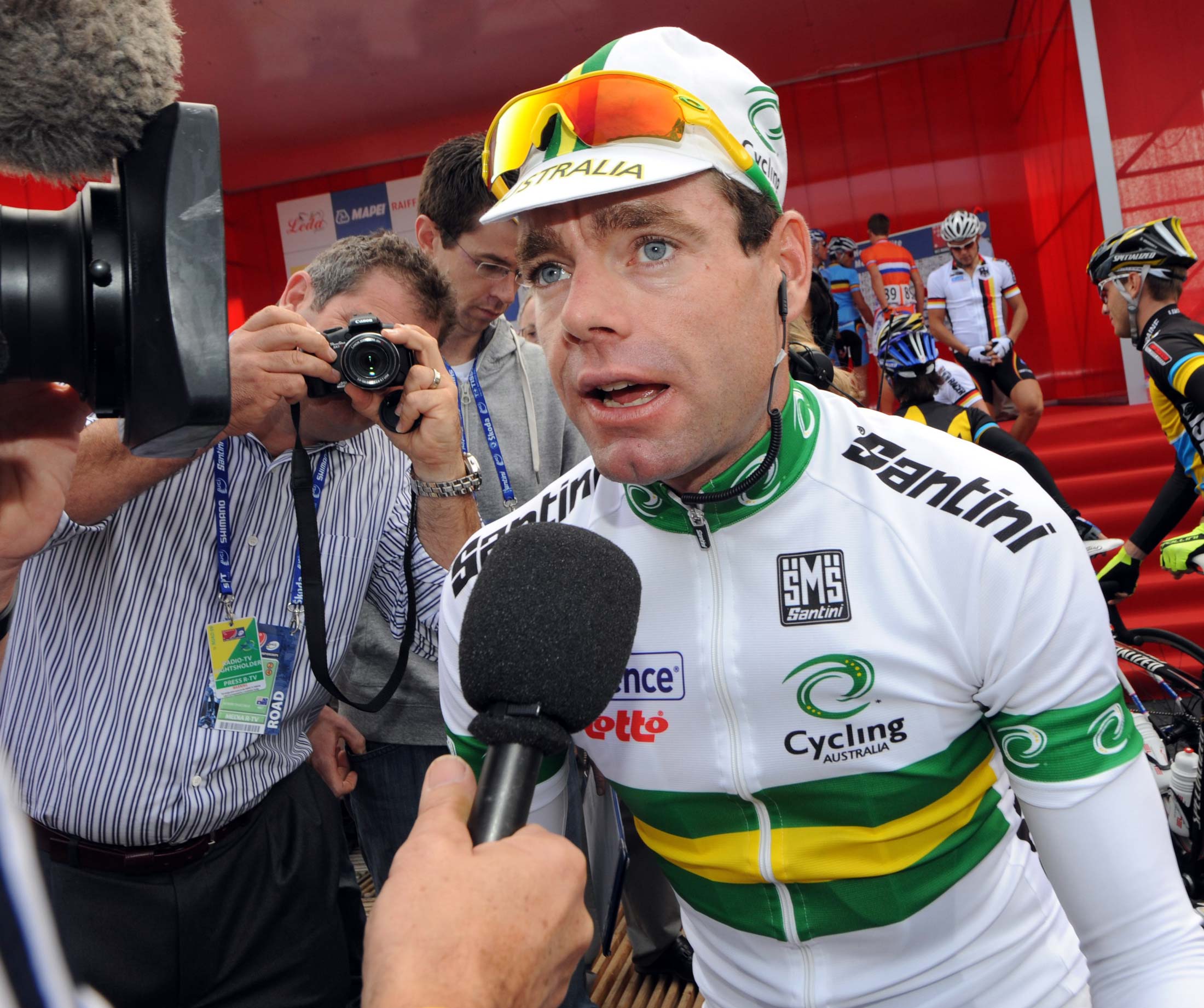
Photo: Graham Watson
Cadel was a local and also one of the favourites in the part of Switzerland he has adopted as his home away from home. He married a girl who grew up just south of the Italian border and the couple eventually settled in Stabio in the Ticino canton.
Of course, [his now ex-wife] Chiara Passerini was there that day. So were many others who believed that this rider from Australia could finally prove that he was the best.
“I had no knowledge of cycling as a sport,” said Chiara of her life before being introduced to her future husband. “My dad knew a little but nobody in my family knew who Cadel was. ‘Oh, he’s mountain biker.’ But that’s all I knew.”
He has won the MTB World Cup (twice) and the ProTour (in a year when the winner was determined by performance in all the major races including each of the Grand Tours – Giro, Tour and Vuelta).
He was the first Australian to lead the Giro d’Italia and the first from his country to finish on the podium of the GC rankings at the Tour (which he did twice, the first time with the second-smallest margin in the event’s long history).
Cadel has won a time trial stage of the Tour (retrospectively) and, in the same year, was voted the most popular athlete in Australia in a poll conducted by a leading Australian media organisation.
He has taken the sport of cycling to a new level in the land where he was born and yet it was in his adopted country that he would pull off the biggest victory of a career that is far from over.
Despite his achievements, Cadel had also fallen short of some of his aspirations. But this didn’t mean he had surrendered hope; there was still unfinished business to attend to. You don’t walk away from something just because of a setback, or even a sequence of them. Had he done that he would have quit cycling a long time ago.

Fabian Cancellara, Simon Gerrans and Alejandro Valverde (above) were captains of their teams for the road race in Mendrisio. Photo: Graham Watson
At the start of his riding days, he happened to be good at it. Early in his biography Close To Flying – which was being finalised in the week the world championships were held – Cadel explains the satisfaction generated by the sensation of a perfect day on the bike. He talks of freedom and the pleasures of cycling, how a trail could seem like nature’s roller coaster. This is what got Cadel hooked. Ever since he’s been working on becoming the best bike rider in the world.
In the process of achieving this, he’s experienced numerous highs and lows.
It is a ride that has taken him up mountains and through valleys, the peaks and troughs of life on the bike. There were moments to celebrate and close calls to frustrate, all of which contributed to a great sense of satisfaction when he did finally achieve what he always believed possible.
When he eventually reached that finish line in first place, Cadel displayed humility.
His simple gestures were the antithesis of what is expected of a world championship winner.
“I had so much personal satisfaction from that result that I didn’t need to be exalted,” he said of his subtle salute.
“It’s funny to look back on the 2009 season. I had so many obstacles to overcome that people aren’t aware of – things that I can’t really talk about because of professional reasons. These setbacks kept coming, one after another after another. It felt like, for as many weeks as there are in a year, I had setbacks.”
Matters beyond his control burdened him during the season. Well before racing commenced he prepared an itinerary that he felt would best suit his objectives. At the top of the list were two races: the Tour de France and the world championship.
With these as the focus, everything else could be slotted in to ensure the best possible results from three weeks in July and the final Sunday of September. Not every problem was disastrous but he became overwhelmed; from team politics to equipment concerns to stupid incidents that took away the chance of victory despite all other elements falling into place.
“Chiara often said to me, ‘One day your honesty and effort will be repaid’. Boom! All of a sudden, it was.
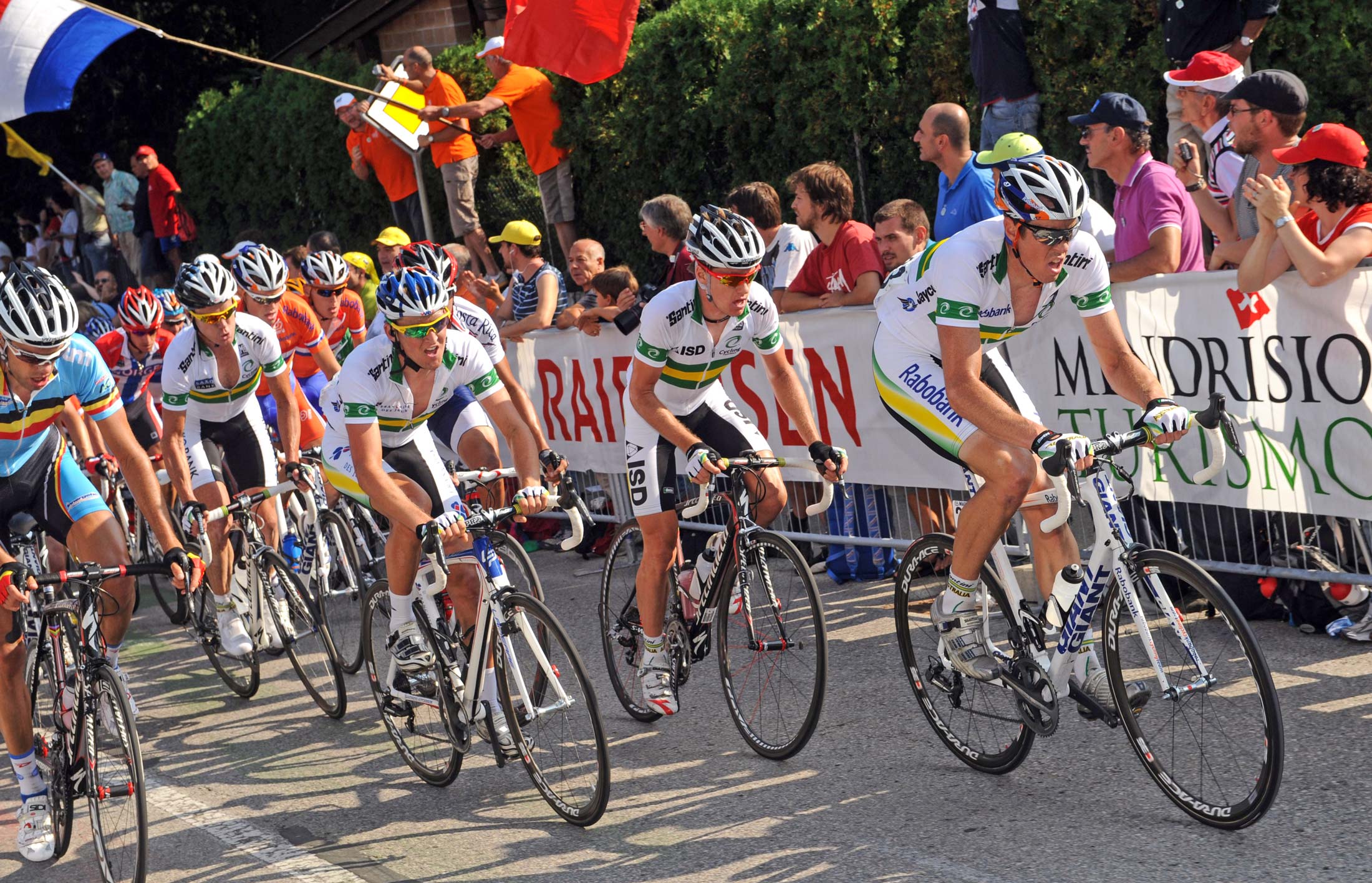
Mathew Hayman, Simon Clarke, Wes Sulzberger and Stuart O’Grady lead the peloton on the 16th of 19 laps of the 262.2km race in Switzerland’s Ticino canton (above). Mick Rogers was the lone Aussie in an escape group but he was outnumbered by Italians and Spaniards so Neil Stephens made the call to chase. Cadel has the rainbow jersey but the efforts of these men — along with Allan Davis, Matt Lloyd and Simon Gerrans — helped him win. Photo: Graham Watson
“From when I got a gap after my attack, and onward to the finish, it was like I was living out a dream.”
What had kept him motivated for all these years – the hope that one day he could prove to himself that he was the best in the world – became a reality in Mendrisio. He is the world champion. And he stood on the podium just three kilometres from his Swiss home with friends, neighbours and relatives all on hand to witness the occasion.
Victory was his, achieved with good tactics, stunning teamwork and surety of his strength. He accepted and savoured it.
The images of Cadel on the podium show a man carefully surveying the scene as though his eyes were lenses and his mind was the hard drive that was uploading all that he saw before him. It needed to be recognised and appreciated, otherwise it might have seemed like just another sequence generated by his imagination. But this time it was real.
“It’s a sickening feeling that you have on the podium, when you’re standing there in second or third place and the guy next to you is putting on the rainbow jersey. I’ve had that often.”
In 2009 it was a different sensation altogether. Still, he maintained his GC Guy approach.
“Honestly, I woke up at 3.00am the morning after the race and I was pissed off at myself; I thought I had a race to ride. I thought, ‘Shit, my recovery is going to be compromised.’ It took a moment to dawn on me: ‘That’s right, I’ve already done the race.’
“That’s what can happen after a three-week stage race. I got so used to waking up and thinking about what I had to do. On this day, I realised it had already been run and won and… oh, that’s the rainbow jersey hanging there on the wall!
“On the Monday after winning, I went riding to clear my head but I didn’t ride with the rainbow jersey on. I only had one, so I went in my normal kit. It was really just another day. My life has not changed one little bit and that’s just fine. I do have a nice jersey and a gold medal hanging in my apartment and, amongst my little family of friends and supporters, I’m very satisfied with our efforts this year.”
– By Rob Arnold


